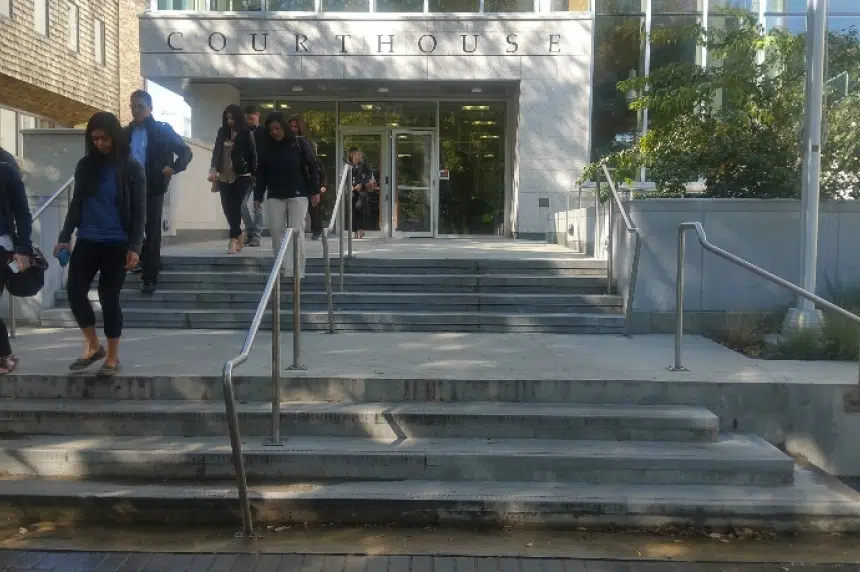Most of the closing arguments in Joshua Petrin’s first-degree murder trial centred on the character and reliability of several key Crown witnesses.
Petrin is facing two charges, first that he conspired with two men to kill T.J. Cromartie.
Second, he’s charged with first-degree murder in the 2012 death of Lorrie Ann Santos, allegedly the result of the gunmen showing up at the wrong house looking for Cromartie.
Crown prosecutor Matthew Miazga made his closing submissions on Wednesday morning. He told court the law is clear that it doesn’t matter whether the intended target of a conspiracy is killed, all that is required for a first-degree murder conviction is proof that there was an intent to kill, followed by the action.
Miazga added that first-degree murder also applies in situations where a killing is done on behalf of a criminal organization and where a contract killing takes place.
Court heard from several witnesses during the trial who admitted to being affiliated with Petrin in the drug trade.
They all testified that Petrin was a high-ranking member of the White Boy Posse street gang and that Cromartie was Petrin’s right-hand man selling cocaine in Lloydminster.
In the summer of 2012, Cromartie vanished. Petrin’s ex-girlfriend, Karissa Dow, told court during the trial that Petrin was furious — Cromartie had ditched him at a medical appointment, went back to their shared home to gather his things and grab a handgun before taking off.
Two witnesses, Colten Menard and Jazmyne Night told court Petrin offered incentives to find Cromartie.
Menard said he was offered the prospect of full membership in the White Boy Posse and said he heard Petrin discuss a $40,000 contract on Cromartie’s head. Night said Petrin offered to wipe her drug debts clean if she could help him find Cromartie.
The Crown’s most important witness can’t be named due to a publication ban, but is someone who claims detailed knowledge of the events surrounding the Santos shooting.
He said Petrin repeatedly instructed the two gunmen to find Cromartie and ‘blast’ him.
The witness said Petrin went with the gunmen to a Saskatoon hardware store to buy a sledgehammer, ski masks and gloves prior to the shooting.
The witness said Petrin lent the gunmen his girlfriend’s car the night they killed Santos and said Petrin gathered up the gunmen’s clothes when they came back from the shooting, taking the clothing with him when he left Saskatoon.
Miazga acknowledged that these witnesses were problematic due to their criminal pasts, histories of substance abuse and various incentives given to them to testify.
However, he said there’s enough confirmatory evidence from other sources to back up their testimony.
He said the witnesses testified to enough details in common that it would be unlikely they were lying.
Brian Pfefferle, Petrin’s defence lawyer, pinned his client’s case to attacking the credibility of the Crown’s witnesses and the tactics used by police during their investigation.
“Ultimately, this case is relying on testimony from criminals, liars and heavy drug users,” Pfefferle said.
In particular, Pfefferle focused on cash payments provided to Night.
She testified she asked for $15,000 to testify, saying she wanted the money in case she needed to relocate herself and her family.
Pfefferle argued police could have offered her witness protection instead.
He said a payment of $2500 cash up front with a promise of $12,500 to come left open the possibility that Night lied to get paid, or that police told her what to say on the stand, and used the money to make sure she delivered.
Pfefferle also took issue with police tactics in questioning Dow in 2012. He pointed to transcripts of an exchange in which officers threatened Dow, who was then about 19 years old and pregnant with Petrin’s child. Officers told her that if she didn’t co-operate, she’d be giving birth in jail and her baby would be taken away.
Pfefferle said this type of threat against a potential witness would likely lead to an obstruction of justice charge for an average citizen.
“Yet, if you put on a badge you can do whatever you want, apparently,” he said.
Finally, Pfefferle said elements of the Crown’s theory don’t fit with accounts Petrin’s paranoid fear of police.
Pfefferle quoted one witness who said Petrin actually considered using white boards to write messages back and forth, rather than speak out loud about drug business in face-to-face meetings.
Witnesses also said Petrin required any text messages about criminal activity to be handled using X-Shield, an encryption program that made the communications impossible for police to recover.
Given Petrin’s care to avoid police, Pfefferle said it was hard to believe he’d knowingly lend out a car linked to himself to be used in a murder, much less drive around in the vehicle in the days following the shooting, with the killers’ clothes in a bag in the trunk.
Pfefferle said it was also doubtful that Petrin would have openly talked about a contract killing with the two men convicted of shooting Santos, given that both were drug users.
“He wouldn’t speak openly to two junkies about a murder,” Pfefferle said.
Pfefferle urged the judge to acquit his client, saying it would be impossible to convict beyond a reasonable doubt.
“You cannot convict on this testimony…You can’t rely on the memories of junkies,” he said.
A verdict is expected in the case on Nov. 3.







